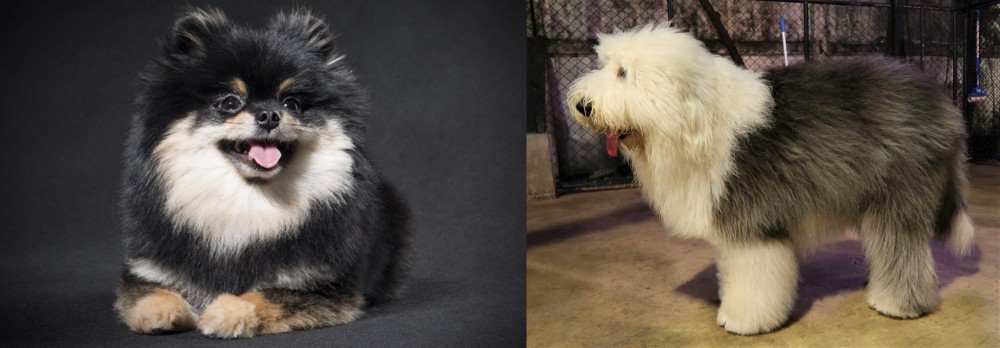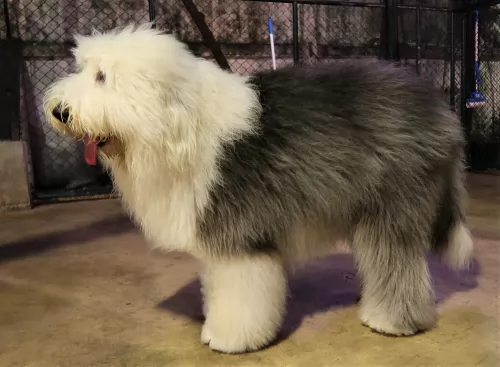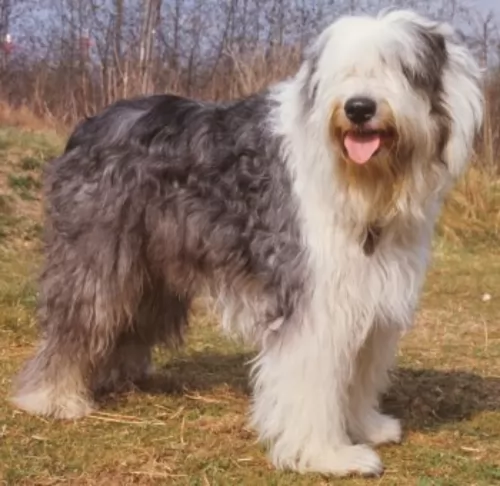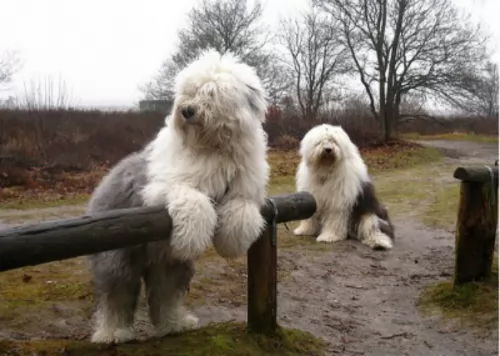 Petzlover
Petzlover German Spitz (Klein) is originated from Germany but Old English Sheepdog is originated from United Kingdom. German Spitz (Klein) may grow 32 cm / 12 inches shorter than Old English Sheepdog. German Spitz (Klein) may weigh 35 kg / 77 pounds lesser than Old English Sheepdog. German Spitz (Klein) may live 3 years more than Old English Sheepdog. German Spitz (Klein) may have less litter size than Old English Sheepdog. Both German Spitz (Klein) and Old English Sheepdog requires Moderate Maintenance.
German Spitz (Klein) is originated from Germany but Old English Sheepdog is originated from United Kingdom. German Spitz (Klein) may grow 32 cm / 12 inches shorter than Old English Sheepdog. German Spitz (Klein) may weigh 35 kg / 77 pounds lesser than Old English Sheepdog. German Spitz (Klein) may live 3 years more than Old English Sheepdog. German Spitz (Klein) may have less litter size than Old English Sheepdog. Both German Spitz (Klein) and Old English Sheepdog requires Moderate Maintenance.
 Also referred to as the Miniature Spitz, the German Spitz is believed to have descended from the Nordic Samoyed and Lapphund. Some dog experts say they were developed from the larger European Spitz, and that they were once referred to as Pomeranians.
Also referred to as the Miniature Spitz, the German Spitz is believed to have descended from the Nordic Samoyed and Lapphund. Some dog experts say they were developed from the larger European Spitz, and that they were once referred to as Pomeranians.
It is also thought that these dogs were in all likelihood brought over to Germany during the Middle Ages. This gives you an idea as to how ancient the breed is. There are actually 4 different Spitz breeds, divided by their sizes.
The dogs were originally used as herding and guard dogs, but today you could say that this toy breed is essentially a companion dog.
 The origin of the Old English Sheepdog is unclear as records weren’t kept. However there are some aspects that suggest the dog originated in the 19th century and that the Scottish Bearded Collie had a significant part in the development of this dog which hails from England.
The origin of the Old English Sheepdog is unclear as records weren’t kept. However there are some aspects that suggest the dog originated in the 19th century and that the Scottish Bearded Collie had a significant part in the development of this dog which hails from England.
It is also believed that the Russian Owtchar was involved in the development of the Old English Sheepdog. The dog was recognized by the American Kennel Club in 1888. In 1904, the Old English Sheepdog Club of America was also founded.
The shape of the dog has changed very little over the years and it was in the 1880s that the dog was exported to the United States.
 Classified as a toy breed, the German Spitz Klein looks like a small fox with his thick fur. He stands at between 23 – 28cm in height and he weighs 5 to 10kg.
Classified as a toy breed, the German Spitz Klein looks like a small fox with his thick fur. He stands at between 23 – 28cm in height and he weighs 5 to 10kg.
He has a sharp foxy face with small pointed upright ears and dark, bright eyes.
The double coat of the dog which can be fawn, cream, reddish, brown or black or a mixture of these colors, is straight, vibrant and off-standing to look at. He has a soft woolly undercoat. The tail of the dog curls up over the back.
The German Spitz Klein has got such a bright little face. He is a social, friendly dog, forming a strong bond with his human family. He is a smart dog too and can be easily trained.
Lively and independent, he is bold and adventurous. Even with a small dog like this, he will do well to be trained and socialized as he just becomes a better dog -obedient and relaxed around strange people and dogs.
Because of his size, he adapts well to life in the city or in the countryside. This is also because he doesn’t require a lot of exercise. The litter size for the German Spitz Klein is between 1 and 5 puppies.
 The Old English Sheepdog is a large dog standing at between 50 and 60cm and weighing between 27 and 45kg.
The Old English Sheepdog is a large dog standing at between 50 and 60cm and weighing between 27 and 45kg.
He is muscular with a broad bottom and hip area. The head is also large and the small ears are carried flat. The tail has always been docked, giving the dog a large panda-bear look to him, but these days the tail is often left long, and the dog loses that square compact look.
When the tail is left long it is well feathered. The coat can become fairly long and is quite harsh and wavy to straight. The coat is essentially grey with white hair over the head area. The puppies are born with their hair being black and white, and later on the traditional grey coloring comes in.
What is quite interesting with this dog is that it stands lower at the shoulder than at the loins, so just like a Panda bear, he also lopes or walks in a bear-like fashion.
The Old English Sheepdog isn’t an aggressive dog. He is social, intelligent and entertaining for his human family, whom he loves to spend time with.
He is an energetic dog too and he would prefer a country setting where there are large fields to run in as opposed to living on a tiny property in the city. He is an adaptable dog though, and will slot into life in the city or suburbs, so long as he is well exercised.
Train him and socialize him and he will become an obedient, amicable pet to have around.
 This litle dog is seriously a case of ‘dynamite in a small package’. Bold, daring, brave, spunky, clever, playful and friendly, your confident little German Spitz Klein makes most families the perfect pet and companion.
This litle dog is seriously a case of ‘dynamite in a small package’. Bold, daring, brave, spunky, clever, playful and friendly, your confident little German Spitz Klein makes most families the perfect pet and companion.
Give him the love and attention he deserves, especially because he is undemanding and low maintenance, and with good care you’re going to have a most adoring companion for more than a decade.
 The Old English Sheepdog is the ideal dog for a family pet. They love spending time with their human family and are affectionate and loyal, getting on well with children as well as other pets.
The Old English Sheepdog is the ideal dog for a family pet. They love spending time with their human family and are affectionate and loyal, getting on well with children as well as other pets.
From the time he is a puppy, you can see that he is fun-loving and easy going while also being intelligent. He is also a guardian and wants to protect his human family.
Provide him with the opportunity to get out into the country sometimes if you don’t live on a farm because he is essentially a farm dog. He used to be a herding dog and likes to be busy. Treat him well and have him trained and socialized and he’ll make you a superb pet.
 You’ve got a pretty healthy little dog breed but be that as it may, it doesn’t make him totally immune to some of the common dog diseases there are. With him, you might want to look out for eye disease and epilepsy.
You’ve got a pretty healthy little dog breed but be that as it may, it doesn’t make him totally immune to some of the common dog diseases there are. With him, you might want to look out for eye disease and epilepsy.
Glaucoma occurs when there is pressure in the eye. Your dog will have pain, red eyes, dilated pupils, increased tear production and corneal cloudiness. You want to have him at the vet for this because putting off treatment can lead to blindness.
This is a condition that can gradually lead to blindness even though the eyes look normal. Difficulty with seeing at night is one symptom. Fortunately the condition is painless and your dog finds ways to cope with the problem.
It is always a good idea when you suspect anything wrong with your pet, to get him to the vet as soon as possible.
 It is estimated that the beautiful Old English Sheepdog can live to be about 10, 11 or 12 years of age if he is looked after well. Just like with other dog breeds though, this particular dog is also prone to some of the common dog diseases there are.
It is estimated that the beautiful Old English Sheepdog can live to be about 10, 11 or 12 years of age if he is looked after well. Just like with other dog breeds though, this particular dog is also prone to some of the common dog diseases there are.
Some of these diseases include hip dysplasia, diabetes, eye diseases and deafness along with some skin problems.
As a chronic disease, Diabetes can affect dogs as well as other animals and humans. Diabetes in dogs can’t be cured but it can be managed, with Diabetes Mellitus being the kind of diabetes most seen in dogs. Whatever kind of diabetes your pet has, the negative effects remain the same.
It can be devastating when your dog has been with you for about 10 years, to discover that he has cancer. Of course, cancer is the leading cause of death found in dogs older than the age of 10.
Many cancers are curable if you catch them early. Malignant lymphoma is a common cancer with dogs but there are other cancers too. The warning signs of cancer in dogs are much the same as what you get with humans. You’ll discover a lump or even an injury that won’t heal. There could also be abnormal bleeding.
There are many different kinds of skin problems seen in dogs, some of which are more common than others. You’ll notice your dog licking a part of the body so that the hair disappears and the skin becomes exposed.
There are skin problems started because of inadequate diet and lack of nutrition. There are plenty of commercially manufactured pet foods that don’t have the right amount of vitamins and minerals your pet needs. Always buy a good quality one to fight these very aggravating skin allergies. A vet may give hydrocortisone products but many dog owners these days try to treat their dogs with natural products.
 As a feisty small-sized dog breed, your foxy little German Spitz Klein needs to get the very best food there is. If you are going to feed him a high-quality commercial dog food, make sure to read the ingredients on the packaging and buy him food according to his size and age. Mix in some home-made food from time to time and always ensure he has constant access to cool, fresh drinking water.
As a feisty small-sized dog breed, your foxy little German Spitz Klein needs to get the very best food there is. If you are going to feed him a high-quality commercial dog food, make sure to read the ingredients on the packaging and buy him food according to his size and age. Mix in some home-made food from time to time and always ensure he has constant access to cool, fresh drinking water.
He has a fairly long, thick coat, so a good brush twice a week will be adequate. While you’re brushing him, check him over for fleas and ticks too.
Always check his teeth and brush them a couple of times a week too. Bad teeth can cause a host of problems, not only with the teeth, but other parts of the body too.
He is an active, jaunty little dog that loves all kinds of games. Being a small breed, he isn’t going to be the kind of dog that you need to include in your jogging or cycling trips, but he is no couch potato, and he will love to go on a walk with you, and it also does him good to get out and about for a change of scenery.
 Food allergies are caused by your dog eating food with ‘bad’ ingredients which don’t agree with him. Make sure your pet has a wholesome diet.
Food allergies are caused by your dog eating food with ‘bad’ ingredients which don’t agree with him. Make sure your pet has a wholesome diet.
Invest in the very best quality commercially manufactured food. Home-made food is always a wonderful treat for any dog but it needs to be kept simple. No exotic, spicy foods and no suddenly changing your pet’s diet.
Simple, nutritional boiled chicken, brown rice or pasta and vegetables such as sweet potato, carrots and spinach added into his kibble as a treat will do wonders for your pet and he will thank you for keeping his meals tasty and simple. A little bit of raw meat added in occasionally can also do him the world of good. Fresh, cool water must always be available.
The Old English Sheepdog is quite a high maintenance dog, what with that long hair and all, and some owners of this dog prefer to take him to the parlor to have the hair sheared and wash, otherwise it could become a mammoth task for a dog owner.
If you opt to keep the hair long, you may end up having to be constantly brushing your pet’s coat to prevent it tangling. Not only that, if you live in a hot area, cutting the hair can help towards keeping the dog cool.
The ears of your dog should be checked regularly for infection as well as the eyes, and keep the nails clipped as well.